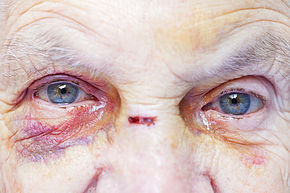Chaplaincy and The Law: Elder Abuse


A while back, I was called in as chaplain following the death of an older woman. As the Deputy Coroner and I were looking at the body, I noticed a lot of bed sores, wounds in various stages of healing, and even what we suspected were defensive wounds possibly caused by abuse. Only a full investigation could tell, but what I saw told me something was wrong. After the Deputy and I discussed this a bit and heard his heart about the matter, I went to talk with the family. Having been present during this part of the investigation, I knew things I could not share with them. This is one privilege of being able to cross the crime scene line. Still, my duty was to minister to the family and the Deputy Coroner. Talking to them and hearing their stories of the woman’s life and recent history did not lessen my suspicions (see below).
As chaplains, we may be exposed to the same sights, smells, and sounds as our first responders. Yet we are called to deal with the situation's humanity, and perhaps spirituality, in ways first responders may not. I walked away that morning with many questions. Who was this lady? Was she a person of faith and hope? What was her story? Why wasn't she given proper care? If she had received proper care, would she still be alive? Truly this was a horrible scene and one I won’t forget for some time.
What is the chaplain’s responsibility when we suspect elder abuse? In my case, I was there with the Deputy Coroner. He was doing the investigation, so there was nothing I needed to report. But when you are out on a call, in a home or care facility, and you suspect elder abuse, what is your obligation to respond?
South Carolina Law about Vulnerable Adults
In a 2018 study, South Carolina came in dead last in caring for vulnerable adults, falling behind the other 49 states and the District of Columbia. This makes the role of the first responder and the chaplain even more important. We get into homes and care facilities and may see things others don’t. And chaplains may be told or observe even more.
In South Carolina law, elder abuse is covered in rulings about protecting vulnerable adults. (Those who read this from other states should research their laws.) According to South Carolina law (SECTION 43-35-10):
“Vulnerable adult” means a person eighteen years of age or older who has a physical or mental condition which substantially impairs the person from adequately providing for his or her own care or protection. This includes a person who is impaired in the ability to adequately provide for the person’s own care or protection because of the infirmities of aging, including, but not limited to, organic brain damage, advanced age, and physical, mental, or emotional dysfunction. A resident of a facility is a vulnerable adult.
While South Carolina law requires members of the clergy to report suspected child abuse, the same is not true when we suspect abuse of vulnerable adults (see SECTION 43-35-25). I hope this was just an unfortunate oversight when our elected officials wrote our laws and can be corrected in the future.
I suspect this was an error because even though the law does not call us mandatory reporters, SECTION 43-35-50 still grants us priest/penitent privileges. Now, what would happen if one of the family members confessed to me (in private) that they abused this woman and that they were very sorry? In this case, Section 43-30-50 would come into play. (Learn more from my previous article about priest/penitent or clergy privilege.)
Principles to Consider
Without the law compelling us to report suspected elder abuse, what can public safety chaplains fall back on? I have three suggestions.
What do your local department's standard operating procedures say? You should find out. Know before you are thrust into a situation like this.
What does your ordinating body say you should do? This can vary from one faith group to another.
What does your conscience say you should do, and what does God say you should do?
Conclusion
In this previous situation, the family and the Deputy Coroner told me they were relieved she was gone. They stated that the deceased had been abusive toward them and expressed relief that she was no longer their problem. The family also threw in a little “God talk” here and there. I wasn’t sure if it was because I was there to paint a better picture for the Deputy Coroner or because it was true. My many years in Public Safety have taught me to listen to my red flags and be skeptical in such situations. This may have held me back from engaging with the family more.
As a chaplain, I will not pass judgment on the family, but I will not blindly trust everything I hear and see, either. It's up to the legal process to decide what happened in the patient’s final hours and how to handle that. I am responsible for protecting and advocating for the vulnerable in keeping with my faith and position as a chaplain. I have found it best to let law enforcement do their job and learn to be a professional witness instead of a hindrance to the investigation. You may no longer be allowed on possible crime scenes if you do otherwise.
